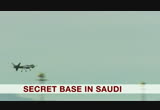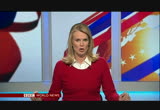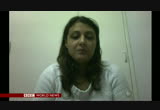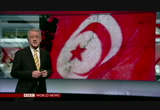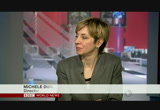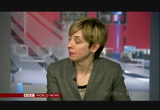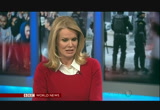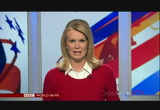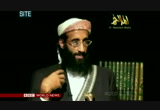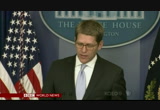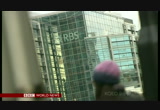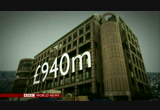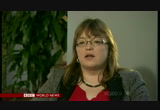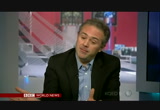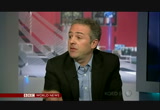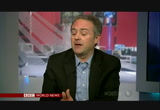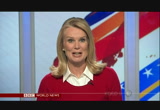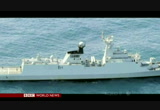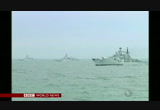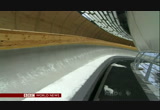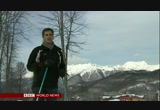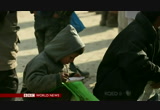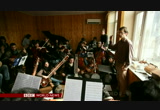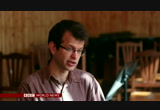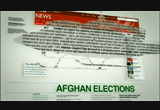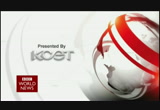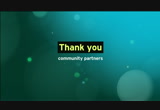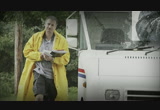tv BBC World News America PBS February 6, 2013 2:30pm-3:00pm PST
2:30 pm
spring erupts. tens of thousands of two nations take into the street as a government credit is shot dead. -- -- thousands of tunisians take to the street as the government member is shot dead. plus a new message to the united states. welcome to our viewers on public television in america and around the globe. two years ago a fruit vendor in 2 nietzsche -- in tunisia set himself on fire, starting the arab spring. thousands took to the streets to protest against the killings,
2:31 pm
and the prime minister has responded, promising he would form a new government. >> he who is the country's first political assassination since the revolution, and it has exposed intrenched divisions and powerful and distrust. crowds of opposition supporters gathered at the interior ministry and tried to storm the building. they blamed the islamist-led government. these are the streets where protests brought down the dictatorship two years ago. eyewitnesses say when the police responded there was panic and chaos. >> police tried to absorb the anger of the demonstrators, but they could not just watch people throwing stones at them. >> he was the leader of a small party and a fierce critic of the largest party in the government
2:32 pm
coalition. he was shot dead by a man on a motorbike as he left home. he denounced it as an act of terror. it is unlikely to satisfy the dead man's supporters, who say he received repeated death threats. it is just over zero years since tunisia celebrates the transparent election, the first since the uprising of 2011. that election made to miyisha somewhat of a beacon -- made tunisia somewhat of a beacon. the islamist party merged, but without a majority. they promised cooperation. it seemed to nietzsche -- tunisia was finding a way to compromise. will today's assassination derails the emerging democracy? >> this is the most difficult
2:33 pm
process of the change, and the new political system has been put together. the new constitution, the divisions between where the country is going, the maneuvering, but generally things are heading in the right direction. >> even so, this will put fear into the heart of the political lives. tonight they called elections. it is a reminder that even the most hopeful of arab democracies remains a work in progress. >> i spoke to michelle. she is the director of the council at the middle east center. we have one of the country's best his the most -- countries that is the most westernized is the most stable.
2:34 pm
it is a surprise? >> assassination has not been a feature of the transitions. it has not been in libya. -- it has been in libya, but in tunisia, there has been other kinds of violence, specifically by extremists, and there was a lot of tension between secular forces, including the opposition party leader who was killed and the main party in the coalition government saying the moderate islamist brotherhood type of party was not doing enough to stop this. we do not know who carried out the assassination, but suspicions are high they were involved, so it is really unfortunate. >> the official who was assassinated had a fairly small following, yet we saw a huge numbers of people turning out on the streets.
2:35 pm
does it suggest there is going to be a strong stand and now from the tunisian population in favor of securing secular rights? >> i think so. there are a significant number of secular as indonesia and even in the government. two of the three parties are secular parties. -- a significant number of seculars in the tunisian government. really the writing of a constitution is not going to go forward until the situation is addressed, and it puts a lot of pressure to figure out how they are going to stop the violence. whacks you mentioned other countries in the region. is it too simplistic to say what we are looking for is a battle for power between secularists and islamist?
2:36 pm
>> that is a feature of the transition end pretty much all the countries but have had revolutions. these transitions are not going to work unless islamists and secularists find ways to work together. it is going to be essential. there are many secular. it is a major issue in the region. we have to remember a around the world transitions from authoritarianism are tough and take a lot of time. >> a lot more than expected. the revelation that america operates a secret base in saudi arabia for launching drones strikes has thrust not a controversial policy in the spotlight again. it was used to launch a drone that killed an odd kind a leader
2:37 pm
in 2011. the report -- killed and al qaeda leader in 2011. >> america's once top-secret drone campaign is slowly emerging into the open. today a new revelation that drones like these have been operating for years out of a secret base in saudi arabia. now the target is members of al qaeda in the arabian peninsula, which saudi arabia has long been working with the u.s. to fight. the pace of drone strikes has been growing rapidly in recent years. american officials said the first time the cia used the base was to kill this man, and wore out milwaukee kill thuis -- to kil this man. \ supporters say strikes like this have seriously damaged out kind of costs -- damaged al
2:38 pm
qaeda possibility to plan a tax, but others say they alienate local populations. brennan will have to answer questions in his confirmation hearing as cia director. the legality of drone strikes is likely to be high on the agenda, especially after a memo was leaked. white house 3 did the white house defended the policy. >> we have a knowledge there are sometimes we use remotely piloted aircraft against terrorists and to prevent attacks on the united states and to save american lives. we conduct the strikes because they are necessary to prevent threats, to stop future attacks, and save american lives. these attacks are ethical and wires. >> the fact there is a secret
2:39 pm
base may mean some of the difficult questions may be raised not just in washington but in saudi arabia's capital, riyadh. >> today the royal bank of scotland became the third major bank to pay for its part in bringing a key global interest rate now in libor. they have been forced to turn over more than $6 million. the incident gives another black guy to the already brews the baking industry. >> the royal bank of scotland is majority owned by the taxpayers. today we learned it will have to write some big checks after being fined a total of 390 million pounds. much of that will be paid for by rbs staff through reduced bonuses.
2:40 pm
what happens at rbs and other banks is unacceptable. i might as it -- insistence the bankers will pay the bill. those involved will pay the full force of the law. >> libor is used as a benchmark. traders tried to manipulate the information it is based on for a profit. regulators released details of messages passed by traders. .ake your mind uphil yes, no problem, is the answer. it is amazing it can make you that much money. barclays was fined 290 million pounds for its involvement and u.b.s. three times that. now rbs says 20% of its staff are involved. they have quit, been fired.
2:41 pm
>> the culture and inheritance of rbs and our industry need to be changed. we are changing them. the job is not done. >> they are finding the misconduct continued until 2010. have you considered your position? >> i think it is important all of us at the top must be held accountable for what we do. if we are a wrongdoer, open and shut case. if we are not involved, you look at totality. >> regulators say rbs was slow to implement an internal crackdown. >> clearly the bank should be up holding the highest operating standards in terms of integrity, and the people who work there should be doing that. rbs is significantly failed. >> rbs is not the last chapter of the stock up.
2:42 pm
several other banks are being investigated. -- not the last chapter of the saga. >> what strikes me most about all the extraordinary things in the story is that it was happening until 2010, after the financial crash, at which time you thought banks would know better. >> this whole libor of rigging scandal is a victim of this crime. it costs the integrity of the financial system, and it certainly does, but they were low balling rates, not high bolling, so they were bringing the benchmark down, so ordinary people are victims. >> the consumers might have liked it because their rates were low, but they were breaking the law. >> they were, and they were affecting a massive transfer of wealth over time from society to the banks, as they proved in many other fields.
2:43 pm
it seems to be so under the radar, it had become so routine over so many years they think they are the last people who are going to get caught. >> just listen to the text is being read out. there is a sense the money was something they could not resist or they thought they were above the law, or they were not going to get caught. >> they thought they were not going to get caught. as someone at the bank and a taxpayer who ended up paying twice, i feel they deserve to get caught, and this is a good action we see today. there is one thing worth noting, and that is the number of our dish banks being caught up in these, whether it is money laundering -- the number of british banks being caught up in these. there are an enormous number of british finance still reduce financial institutions getting
2:44 pm
involved in one way or another, and i think there is a broader question over british capitalism, and that is a concern. >> there is a complication that rbs is owned by the taxpayer, so the fine is to bring the money back. is that the thing that might deter future incidents of this kind. if the money is coming from your pocket, perhaps you would not do this. >> the manipulation took place because the royal bank was sitting next to the derivatives traders, who were profiting from this manipulation. there is all sorts of changes in terms of regulatory compliance and risk-management. in terms of architecture and where people said, that are going to have to take place, but here in america we have the volcker commission. both have recommended the same thing.
2:45 pm
separate retail banking from investment banking. that is going to be the strength. if is not to, this will continue in one form or another. >> they end up sending those tax to each other. thank you for a much for coming in. saturday mail deliveries will be no more at the beginning of august. the u.s. postal service has been pushing for the cancellation of we can delivery four years. they announced the changes in -- cancellation of weekends delivery for years. they announced the changes and increasing pressure in the internet age. racing to be ready in time. russia is spending a day. -- spending big.
2:46 pm
today there was another development in the ongoing standoff between china and japan in the east china seas. a day after accusing the warship of using weapons on a japanese destroyer, japan's prime minister fired back, describing it as a provocative act. he said the country's need to go back to a strategic partnership with mutual benefit. after the recent flare-up, is that possible? >> on january 30, japan says the chinese navy locked its radar on a japanese destroyer in the east china sea. about 10 days earlier, tokyo says another chinese for gates -- chinese frigate did the same to a helicopter. japan cost prime minister condemned the incident. >> at a time they are resuming
2:47 pm
talks, it is regrettable china has carried out provocative action towards japan. >> the incidents are reported to have taken place close to this group of islands in the east china sea, which japan controls but china claims as its own. for months japanese and chinese coast guard ships have been engaged in a game of cat and mouse around the islands. china has sought to assert its claims. previous incidents have only involved civilian ships, not war ships loaded with missiles. so far china's foreign ministry has refused to confirm the incident or give any explanation to the chinese actions, but the u.s. government is expressing its concern. it has called on beijing to avoid actions that could undermine peace and stability of the region.
2:48 pm
>> there are 365 days left until the next winter olympics, and that is 365 days to build stadiums and ready the ski slopes. the hurdle of hosting the games has made it a lot harder than having to build everything from scratch. these will be the most expensive olympics in history. daniel has gone to take a look. >> the caucuses mountains in southern russia, one of the most unexploited winter playgrounds. that is all changing. this brand new bobsled run is one of 10 venues especially built for the most expensive olympics in history. this cost more than beijing and
2:49 pm
three times last year's london summer olympics. an unusually large chunks are being paid by the country's wealthiest man. the oligarchs. he is fourth on barraso's rich and liz, a multimillionaire, and he has built new -- fourth on ofsia's rich list multimillionaire's. >> all the rich people want to change their image in russia. they want to do something that would be considered useful, something good for them. >> five years ago this was nothing but mountains and forests. the whole thing was built from scratch. this has become a building site
2:50 pm
in the world. a huge olympic park has a human cost. this is his new home, a rented garage with room upstairs which he shared with husbands and sons. he used to have a house by the beach, but it was obliterated by the olympics. >> my oldest son keeps asking me why and who i am living like this. i say because of the olympics. everything is changing in life, everything. >> the athletes are more positive. last week one of britain cost reduced hopes was skating well and anticipating next year's and winter olympics. >> they have built everything from scratch just now. that may be does not look like it is ready, but that is because
2:51 pm
they are building it from scratch. >> this will be one of the most controversial in years. the human rights record is under scrutiny, and 300 miles away, there are daily bombings and shootings in the turbulent republics of chechnya. >> now to an orchestra unlike any other. young musicians from afghanistan are in the united states showing americans a different side of their war-torn country. this opportunity offers an escape from their daily lives. >> life is tough on cobble's -- on kabul's streets.
2:52 pm
he knows these streets well. they were once his home, but he is leaving them behind. >> music has changed my life. everything has changed. i am eating bird food. when he walked the streets, he made less than $1 a day. half the children and and and now our street kids or orphans. >> i am so excited to be going
2:53 pm
to america. i want to show them there is nothing stopping afghan girls from loving music. >> this is the first time she has left the country. >> the taliban are fighting every day. in america is peaceful. >> u.s. offices are going to see progress is made, and i hope we are able to show it is important for americans to stand side-by- side and support them in whatever ways we can. >> what is talk of their wish list?
2:54 pm
2:55 pm
>> make sense of international news at bbc.com/news. >> funding of this presentation is made possible by the freeman foundation of new york, stowe, vermont, and honolulu, newman's own foundation, and union bank. >> at union bank, our relationship managers work hard to understand the industry you operate in, working to nurture new ventures and help provide capital for key, strategic decisions. we offer expertise and tailored solutions in a wide range of industries. what can we do for you? >> "bbc world news" was presented by kcet, los angeles.
2:58 pm
2:59 pm
on the "newshour" tonight, we talk with postmaster general patrick donahoe. >> brown: then, president obama picks r.e.i. executive sally jewell to run the interior department. we look at how the cabinet is shaping up with many posts yet to fill. >> ifill: we have two stories from the middle east. margaret warner gets the latest from tunisia, the birthplace of the arab spring, where a leading opposition figure was assassinated today. >> brown: and ray suarez reports on the plight of syrian refugees who've fled to lebanon. >> at this tent camp in al-marj, in the eastern part of lebanon's bekaa valley-- only 25 miles from the syrian border-- refugees are struggling to adapt to a new, impermanent reality. >> ifill: and we close with a look at what's happening with the boy scouts, as they struggle to decide whether to lift a long-standing ban on openly gay members. >> brown: that's all ahead on tonight's "newshour." >> major funding for the pbs newshour has been provided by:
123 Views
IN COLLECTIONS
KQED (PBS) Television Archive
Television Archive  Television Archive News Search Service
Television Archive News Search Service 
Uploaded by TV Archive on

 Live Music Archive
Live Music Archive Librivox Free Audio
Librivox Free Audio Metropolitan Museum
Metropolitan Museum Cleveland Museum of Art
Cleveland Museum of Art Internet Arcade
Internet Arcade Console Living Room
Console Living Room Books to Borrow
Books to Borrow Open Library
Open Library TV News
TV News Understanding 9/11
Understanding 9/11